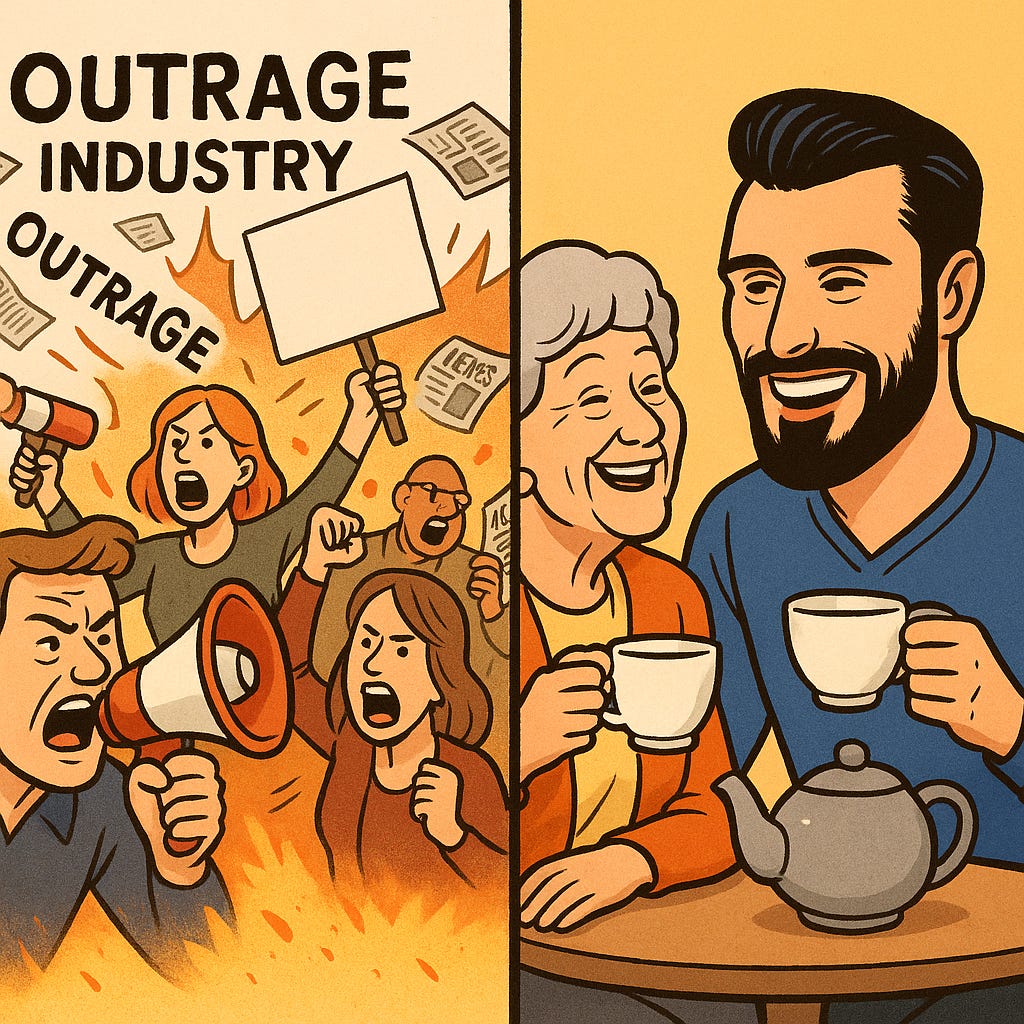Last Week’s News That Wasn’t: Rylan, Immigration and the Row That Fizzled
It says something about our politics — and our media — that the biggest row of late August was not about interest rates, public services or even the Prime Minister. It was about Rylan Clark, daytime TV, and a passing remark on asylum hotels
.
The whole affair is worth looking back on, not because it really mattered, but because it shows how the outrage machine works — and why we shouldn’t be fooled by silly-season storms.
⸻
The Moment
Rylan Clark has always been a likeable figure. Flashy but self-aware, camp but straight-talking, and forever bringing his mum into the picture. When he sat on the This Morning sofa and declared that the asylum hotel situation was “absolutely insane,” he wasn’t launching a policy platform. He was doing what good presenters do: saying out loud what plenty of viewers at home were thinking.
He even balanced it. He praised migrants in the NHS. He said legal immigration was a good thing. He clarified afterwards: “You can be pro-immigration and against illegal routes. Stop putting everyone in a box.” That is not the language of a demagogue. It is the voice of a bloke with common sense.
But daytime TV isn’t designed for nuance. Once you mention “iPads, games rooms and four-star hotels,” you are in tabloid territory. Campaigners and commentators pounced. Was it accurate? Not really. Did it capture a mood? Absolutely.
⸻
The “Facts” Versus the Feeling
Much was made of the detail. No, asylum seekers don’t all get iPads. No, four-star hotels are hardly the standard. The cash allowances are modest, not lavish.
But this misses the point. Rylan wasn’t presenting a Home Office spreadsheet. He was sketching a quick, emotional picture for his audience. And for people stuck on waiting lists or watching their bills climb, the shorthand made sense. It was rough, it was TV, it was recognisable.
This is the truth so often missed: facts matter, but framing matters more. Political discourse lives in numbers. Human discourse lives in pictures. Rylan painted one, clumsily perhaps, but effectively.
⸻
The Outrage Machine
Then came the explosion. Headlines suggested he had been sacked. Social media accused him of parroting far-right talking points. Campaigners — many of whom make their living from constant indignation — piled in.
It was all smoke. Rylan’s stint was always due to end that week. There was no sacking. There was no scandal. Just the usual suspects whipping up a frenzy because August demands noise and they supply it.
We have a professional class of outrage merchants in this country. They exist in a perpetual crouch — either on their knees before funders, or lunging at the throats of whoever is in the news. If real solutions were ever found, they’d be out of work. So they thrive on crisis and pile-ons, however thin the substance.
Rylan was simply their latest meal ticket.
⸻
Whose Politics Was It Anyway?
What’s fascinating is how easily his comments could be mapped onto any party:
• Reform UK heard echoes of their core message: borders are broken, hotels are wrong.
• The Conservatives could nod along: years of pledges to end hotel use, still not delivered.
• Labour could claim him too: legal routes yes, unsafe crossings no, hotel use scaled back.
• The Lib Dems found his call for fairness echoed their own.
• The Greens could seize on his “don’t put people in boxes” line.
Strip away the noise and he wasn’t flying any party flag. He was articulating the muddled middle ground where most people actually live.
⸻
Last Week’s News That Wasn’t
And that is why the row fizzled so quickly. It didn’t stick because it wasn’t really a story. It was silly season, when Parliament is asleep, political journalists are desperate, and the smallest spark is fanned into a flame.
By this week, the flames are already out. The caravan has moved on. What’s left? A reminder that Rylan is still Rylan: straight-talking, likeable, the sort of presenter the nation has adopted as its own.
He wasn’t loved less for speaking his mind. If anything, he was loved more. Not only by his mum — by the millions who saw a flash of honesty amid the froth.
⸻
Why It Matters
This isn’t just a quirky footnote. It tells us something about the way politics and media feed each other. We mistake noise for substance. We mistake outrage for debate. And we mistake a passing remark for a crisis.
Last week’s “row” was never about asylum policy. It was about the machinery of headlines, clicks, and professional outrage. It was news that wasn’t — except as a mirror of the circus itself.
⸻
In the end, Rylan goes back to being Rylan. The outrage class goes back to its crouch. And the rest of us? We go back to wondering why the biggest story of the week was never really a story at all.



